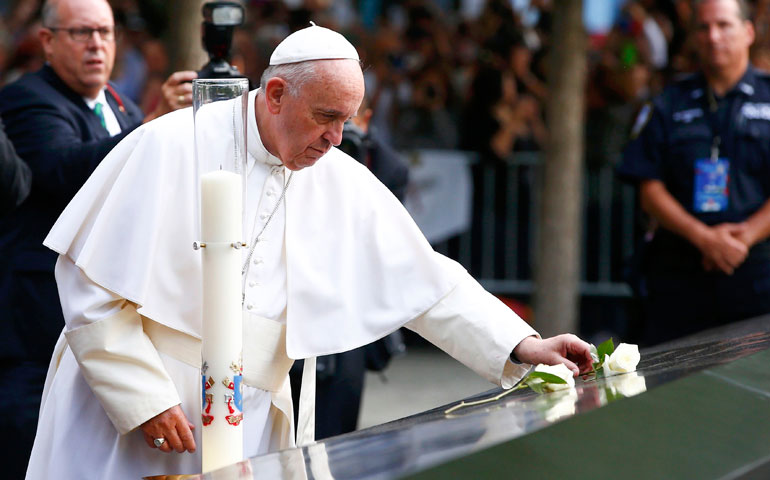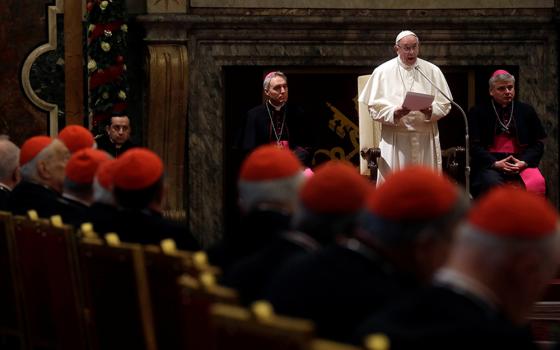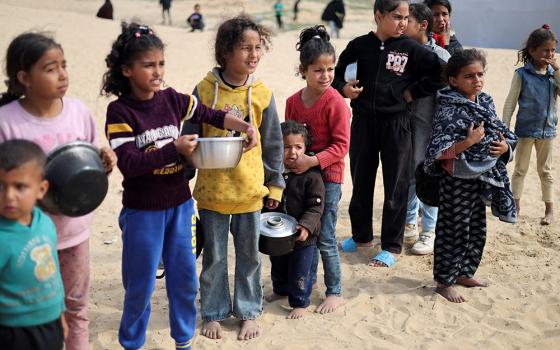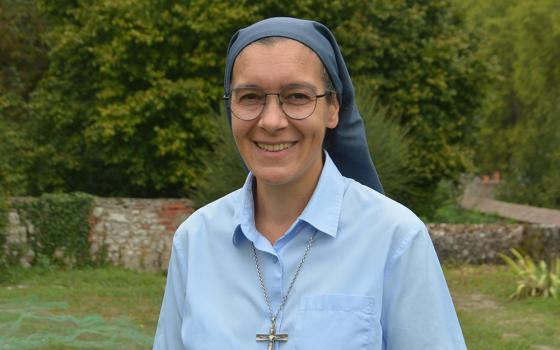
Pope Francis places a rose at the South Pool of the National 9/11 Memorial and Museum Sept. 25, 2015, in New York. (CNS/Tony Gentile)
Standing on the corner of the street where I was living in New York City's Greenwich Village, I could see red flames coming from the two towers of the World Trade Center. From less than 2 miles away, I could see things falling from one of the towers. I thought the heat from the flames was popping out the windows. I later found out I was horribly mistaken. It was people jumping from the building.
I watched the first tower fall. The World Trade Center was there in the morning and gone by the afternoon. No longer could I tell people visiting New York to head toward the World Trade Center.
It has been 15 years since the attack on the World Trade Center, the Pentagon and United Airlines Flight 93 shocked the world. A new World Trade Center has been built; a memorial and museum have been opened to honor those who lost their lives. Pope Francis held an interfaith prayer service during his visit to the U.S. in September 2015. Yet despite all the signs of a return to "normalcy," the world has greatly changed since that day.
Related: At Ground Zero, Francis asks 9/11 families to be instruments of peace (Sept. 25, 2015)
Since Sept. 11, 2001, the U.S. has waged two at very least ill-advised wars in Afghanistan and Iraq; we have seen three popes; al-Qaeda rose to great prominence and then in 2014 took second place to the Islamic State group.
On Dec. 17, 2010, shortly after the end of the Special Assembly for the Middle East of the Synod of Bishops, Mohamed Bouazizi, a Tunisian street vendor, set himself on fire in protest against his government. He died of his wounds on Jan. 4, 2011. What the Western media would -- unknowingly prophetically -- call the "Arab Spring" had begun.
I say prophetically because spring in the Middle East is not the time of rebirth that it is in many parts of the Northern Hemisphere, but rather the onset of often killing heat and dryness. The Arab Spring unleashed forces that many outside the region initially believed would usher in democracy, tolerance and pluralistic societies. It was not long before it was clear that the Arab Spring was actually going to unleash forces that would undo the complex and centuries-old fabric of social contracts in the Middle East.
More than 3,000 people died in the attacks on Sept. 11, 2001. Since then, hundreds of thousands of civilians have lost their lives in the Middle East and millions have been forced to become refugees and homeless, internally displaced persons as a result of the war in Iraq and the civil war in Syria.
Political Islam came to the world stage with force during the Iranian Revolution in 1979. However, the organization al-Qaeda and its leader Osama bin Laden captured the attention and horror of the world on Sept. 11, 2001, in ways that the Iranian Revolution had not.
The ensuing war in Iraq and the overthrow of Saddam Hussein made conditions ripe for chaos to erupt in the region. And erupt it did. A violent, thuggish character named Abu Musab al-Zarqawi became notorious for terroristic raids against Americans, Shiites and even other Sunni Muslims in the Middle East. In the vacuum created in Iraq, he was able to form al-Qae-da there, which ultimately metastasized into what is now known as ISIS, ISIL or, in Arabic, D-a'ish.
On Sept. 11, 2001, no one could have foreseen the Middle East of 2016, in which Iraq is close to being a failed nation; Syria is engaged in a suicidal civil war; and ISIS controls large swaths of Iraq and Syria, massacring Christians, Yazidis, Shabaks, as well as Sunni Muslims who don't agree with them. The Islamic State's self-proclaimed caliphate under the so-called Abu Bakr al-Baghdadi has brought wanton destruction on a scale that has not been seen since the Mongol invasions of the 13th century.
Self-described jihadis have carried off murderous attacks in the U.K., Spain, France, Belgium and Germany, bringing terror to countries that had not previously experienced it. Many European countries are being inundated with refugees. The world of September 2016 has little in common with that of September 2001.
While there are very few hopeful signs, there are, nonetheless, some important things that are happening and are often overlooked. In the Middle East, where Christians often simply ignored each other, there is now a new recognition of what the pope calls the "ecumenism of blood." Threatened with extinction, many Christian churches are now working together, finding they have much in common that they may have overlooked before. The crisis in the Middle East, especially the refugee crisis, has brought an encouraging new era of cooperation between Francis and Greek Orthodox Patriarch Bartholomew.
Although it has unfortunately not received the coverage it deserves, the Muslim world has also reacted with shock and horror at what is being done in its name. Muslim leaders from Iraq to Morocco to France to Indonesia have been gathering to ask themselves what is happening to Islam and condemning the violence.
Perhaps the most impressive action on the part of scholars from every tradition in Islam was "A Common Word." Addressed to all Christian leaders, the letter, published in 2007, calls Christians and Muslims to work together for peace. In a most powerful statement, the Muslim scholars proclaimed "our very eternal souls are all also at stake if we fail to sincerely make every effort to make peace and come together in harmony."
Groups of scholars from Cairo's al-Azhar, the premier university of the Sunni Muslim world, have condemned the atrocities done in the name of Islam and declared the "caliphate" illegitimate. Many Sunni scholars and institutions have responded negatively to the Islamic State's claims of being Muslim. In January, Sunni scholars in Marrakesh, Morocco, prepared a document on the rights of religious minorities in Muslim countries, while Shiite scholars in June published the Irbil Declaration on the rights of citizens in Iraq.
It would be simply unwarranted to say that the world is better and safer since Sept. 11, 2001. It is not. However, the horrors, atrocities and outright genocides that have been perpetrated in the name of religion have challenged Muslims and Christians to re-examine our sacred texts and traditions to understand how they can be misused to justify violence.
We are working to use and interpret our texts and traditions to provide for a world where people can live faithfully in pluralistic societies, where there is freedom of religion and where the rights of minorities are protected. We are still a long way from achieving that goal, but at least many religious leaders, including Muslims, are now realizing that working together is critical to our survival.
[Franciscan Fr. Elias D. Mallon is the external affairs officer for the Catholic Near East Welfare Association.]







